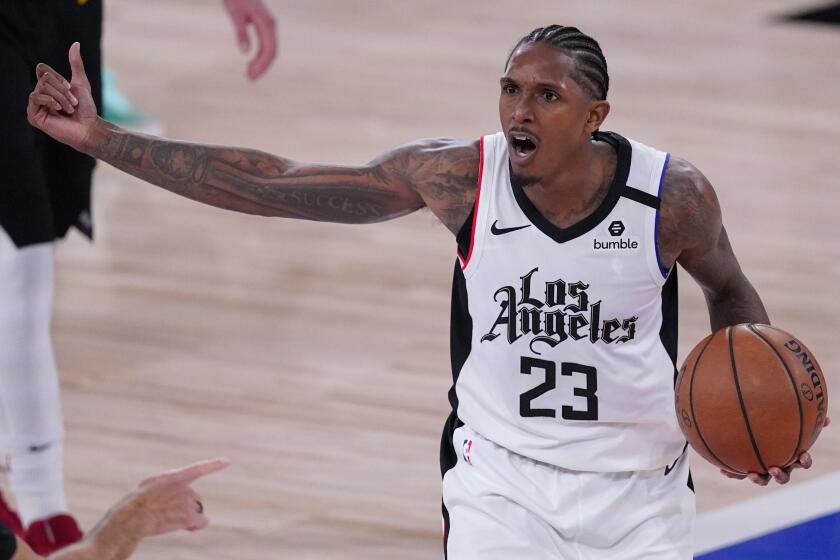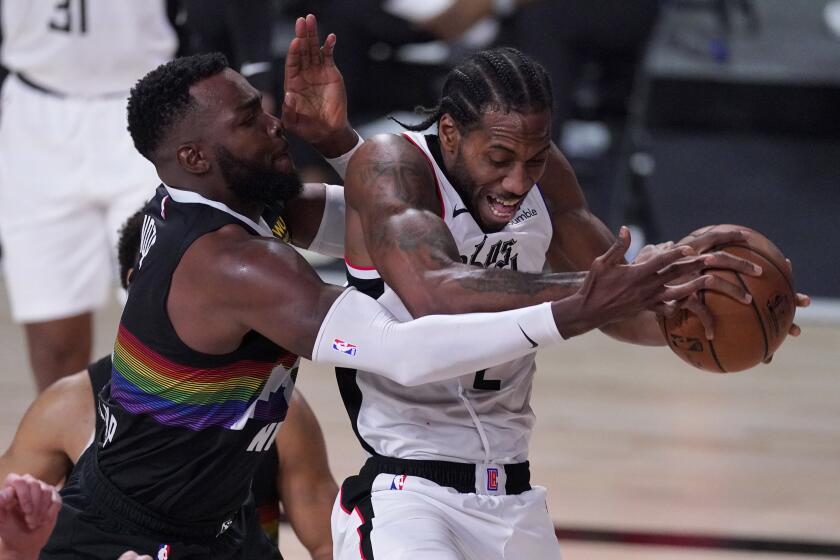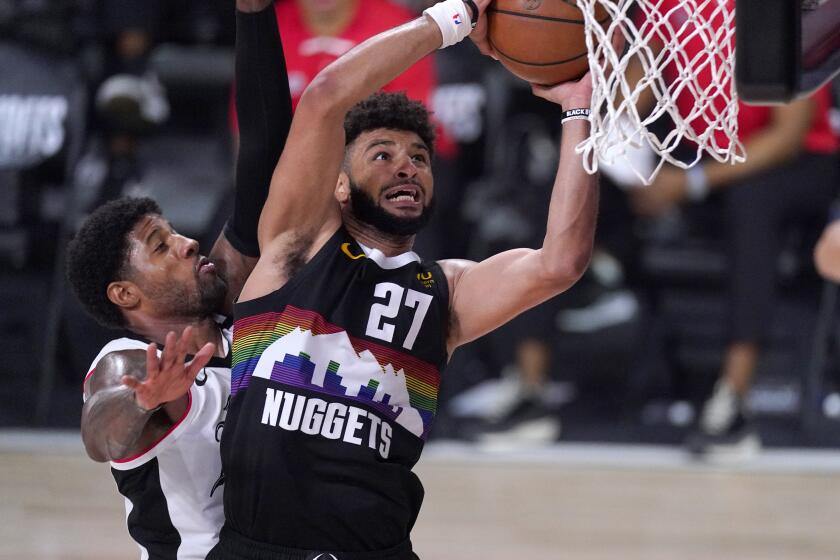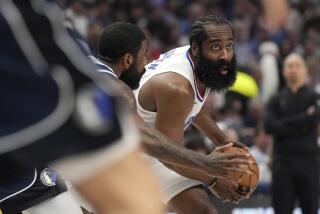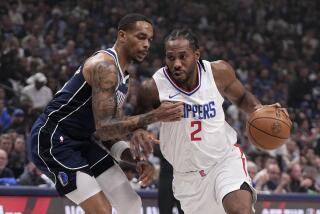Hallway Series pass denied? Takeaways from Clippers’ Game 6 loss to Nuggets
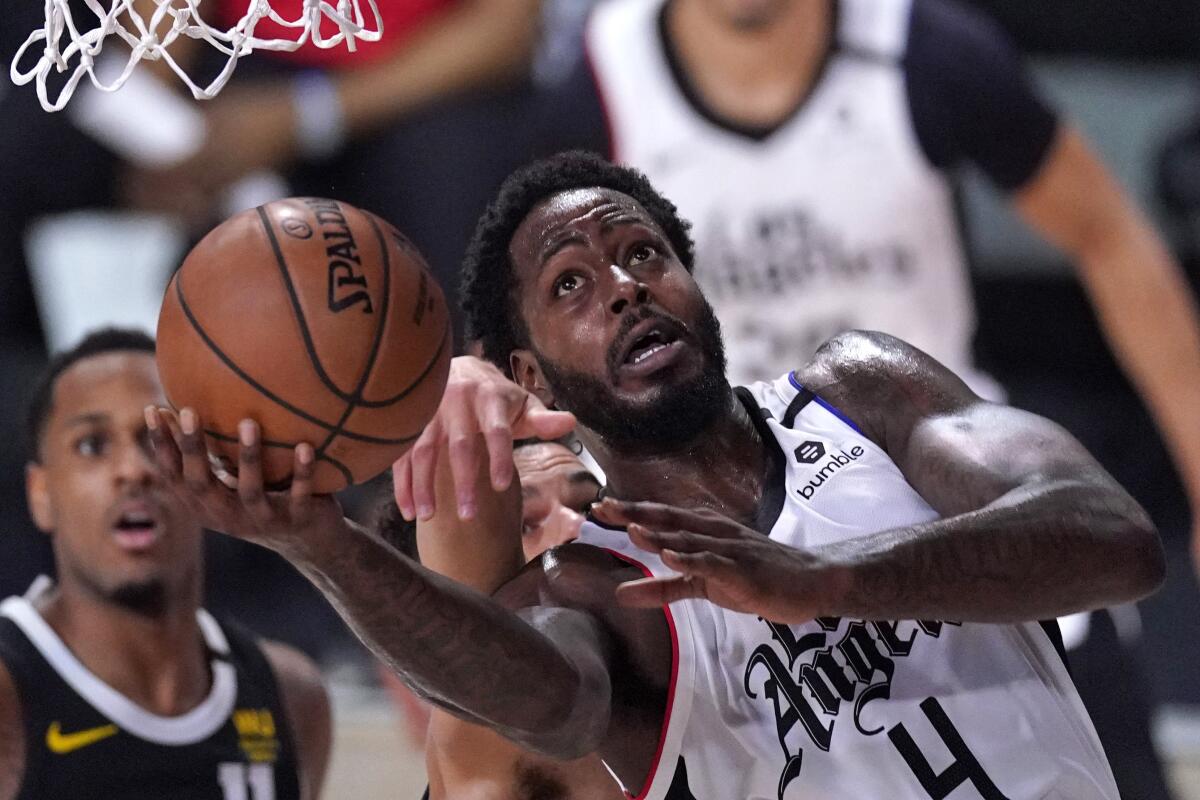
- Share via
Ever since the Clippers added Kawhi Leonard and Paul George 14 months ago, moves that followed the Lakers’ addition of Anthony Davis to a roster already featuring LeBron James, the potential meeting of the Staples Center tenants during a postseason “Hallway Series” has been highly anticipated.
To make that a reality, however, the Clippers must win Game 7 of their Western Conference semifinal Tuesday against a Denver team that has rallied from deficits of 16 and 19 points to win the last two games and tie the series.
It will be Denver’s fourth consecutive playoff series to reach seven games. They are 2-1 in such games.
“They have been here,” George said after Sunday’s 111-98 Clippers loss in Game 6. “They have been a part of a lot of Game 7s. This team, they fought — they have been fighting all year. They have been fighting for a while together. This group’s been together. So we know what we are up against.
“Again, we have the utmost respect for them as opponents, but I like our chances. I like our odds. I like what we have. Again, it’s on us to finish this out.”
The playoffs have given Kawhi Leonard, Paul George and the Clippers a chance to show the team’s new identity. They’re in danger of repeating history.
Five takeaways from Game 6:
1. In explaining their lost 19-point lead from Sunday’s third quarter, the Clippers pointed to schematic reasons, not mental blocks.
“No, no, no,” George said. “It’s nothing that, you know, it’s nothing that’s within our team. They are just coming out and give them credit. That’s what they have to do. They have to fight to get back in the games, and they are doing it. They are not quitting.”
Denver did do a better job limiting the Clippers’ easy shots in transition (10 points during the final 36 minutes) and was disciplined in keeping Leonard from easily getting to his spots on offense. He didn’t make a single shot from midrange. And yet it still doesn’t fully explain why losing double-digit leads, a persistent problem all season, continues to haunt the Clippers given they understand all too well the warning signs of slippage. Coach Doc Rivers cited the roster’s lack of continuity this season, saying they were a veteran team, but not a veteran team together.
Leonard’s postgame answers, in which he repeated the need to pay attention to detail, suggested a team still understanding how to sustain its concentration and effort.

Highlights from the Clippers’ loss to the Denver Nuggets in Game 6 on Sunday.
The Clippers had decent opportunities to score after halftime, but missed 10 of their 15 shots taken inside the paint. They flew past shooters on closeouts, leading to wide-open Denver shots.
“Just make sure when we’re up, we need to keep our focus,” said Leonard, when asked how the Clippers can fix their season-long problem of allowing big leads to disappear. “Still run our plays, execute, and don’t be lazy on defense. Still have attention to detail and keep playing hard.”
Rivers was asked whether the game signaled a lack of killer instinct.
“I have no idea,” he said.
2. One of the Clippers’ clearest opportunities to seal the victory came when Denver guard Jamal Murray fell hard to the court with 10 minutes left in the third quarter after his shot was blocked at the rim by George. George, who’d fallen on top of Murray, got up and ran downcourt, where he knocked down a three-pointer for a 19-point lead.
Murray stayed down, writhing in pain, but stayed in the game and grimaced until the very end. Like Denver, Murray was battered but unbroken. Over the next 22 minutes, Denver outscored L.A. by 32 points, shooting 63% to the Clippers’ 25%.
“From that point on, the game, the complexion of the game completely changed,” Rivers said. “I thought we had the more physical team. We were attacking and we were getting into the paint and from that point on, if you look at that point on it was a reverse of script.
The Clippers are saying all the right things after blowing another lead in Game 6 loss to Denver.
“… It was beautiful basketball, and then we stopped playing. We stopped moving the ball. We stopped attacking on offense.”
3. Clippers backup guard Reggie Jackson didn’t play in the third and fourth games of the series to make way for more minutes for Patrick Beverley but was inserted at a critical moment, with 7:21 remaining in the fourth quarter and the Clippers leading by two.
“Sometimes we’re down and you just try to go with someone,” Rivers said. “One thing Reggie has done is he’s shown the ability to make shots. He struggles in other areas but he does have that ability, and at the time when you put Reggie in, we needed someone to make a shot because we weren’t doing that.”
Jackson didn’t get a chance to take a shot and was removed within 56 seconds.
4. A significant amount of Rivers’ time postgame was spent lamenting his team’s lack of pace in the second half. That can be attributed directly to their defensive struggles. As Denver shot 60% in the third quarter and 61.9% in the fourth, opportunities to grab defensive rebounds and push upcourt grew scarce.
“They are playing at a higher pace in the third and fourth quarters than we are, simple as that,” George said. “We have got to match that on their end, and we have to find our pace and tempo on our end.”
The Denver Nuggets rallied in the second half for a second consecutive game to beat the Clippers 111-98 on Sunday and force a deciding Game 7.
If creating tempo means producing stops, then the Clippers need Beverley to play more disciplined in Game 7 than he did Sunday. Beverley fouled out in 18 minutes, nine fewer than he played in Game 5. Beverley continues to be held under a minutes limit, but even if he’d played in the mid-20s, it would have afforded the Clippers a few more possessions with their second-team all-defense guard on the floor.
5. Earlier in this postseason, Leonard said that he doesn’t talk about his past playoff experience often with his teammates. These are different rosters, with different matchups to solve. Yet this could be a moment where his vocal leadership is necessary. He, better than anyone on this roster, has experience playing unafraid in what can be a nervy situation. His game-winning shot at the buzzer in Game 7 against Philadelphia last season sent Toronto to the conference finals.
He was asked what his message will be for his teammates entering Tuesday’s game.
“Just got to leave it all out on the floor and make sure we are paying attention to detail and executing and communicating on the defensive end and that’s all we can do,” he said. “Go out there and play hard and just make sure we know the game plan.”
More to Read
Get our high school sports newsletter
Prep Rally is devoted to the SoCal high school sports experience, bringing you scores, stories and a behind-the-scenes look at what makes prep sports so popular.
You may occasionally receive promotional content from the Los Angeles Times.

